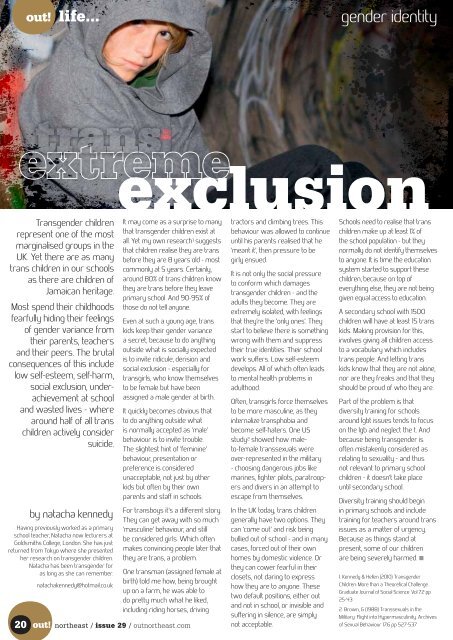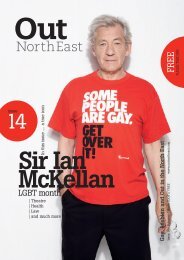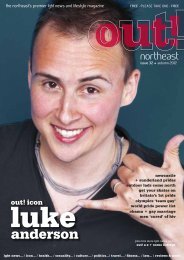northeast - out! northeast magazine
northeast - out! northeast magazine
northeast - out! northeast magazine
Create successful ePaper yourself
Turn your PDF publications into a flip-book with our unique Google optimized e-Paper software.
life...<br />
gender identity<br />
trans<br />
exclusion<br />
Transgender children<br />
represent one of the most<br />
marginalised groups in the<br />
UK. Yet there are as many<br />
trans children in our schools<br />
as there are children of<br />
Jamaican heritage.<br />
Most spend their childhoods<br />
fearfully hiding their feelings<br />
of gender variance from<br />
their parents, teachers<br />
and their peers. The brutal<br />
consequences of this include<br />
low self-esteem, self-harm,<br />
social exclusion, underachievement<br />
at school<br />
and wasted lives - where<br />
around half of all trans<br />
children actively consider<br />
suicide.<br />
by natacha kennedy<br />
Having previously worked as a primary<br />
school teacher, Natacha now lecturers at<br />
Goldsmiths College, London. She has just<br />
returned from Tokyo where she presented<br />
her research on transgender children.<br />
Natacha has been transgender for<br />
as long as she can remember.<br />
20<br />
natachakennedy@hotmail.co.uk<br />
It may come as a surprise to many<br />
that transgender children exist at<br />
all. Yet my own research 1 suggests<br />
that children realise they are trans<br />
before they are 8 years old - most<br />
commonly at 5 years. Certainly,<br />
around 80% of trans children know<br />
they are trans before they leave<br />
primary school. And 90-95% of<br />
those do not tell anyone.<br />
Even at such a young age, trans<br />
kids keep their gender variance<br />
a secret, because to do anything<br />
<strong>out</strong>side what is socially expected<br />
is to invite ridicule, derision and<br />
social exclusion - especially for<br />
transgirls, who know themselves<br />
to be female but have been<br />
assigned a male gender at birth.<br />
It quickly becomes obvious that<br />
to do anything <strong>out</strong>side what<br />
is normally accepted as ‘male’<br />
behaviour is to invite trouble.<br />
The slightest hint of ‘feminine’<br />
behaviour, presentation or<br />
preference is considered<br />
unacceptable, not just by other<br />
kids but often by their own<br />
parents and staff in schools.<br />
For transboys it’s a different story.<br />
They can get away with so much<br />
‘masculine’ behaviour, and still<br />
be considered girls. Which often<br />
makes convincing people later that<br />
they are trans, a problem.<br />
One transman (assigned female at<br />
birth) told me how, being brought<br />
up on a farm, he was able to<br />
do pretty much what he liked,<br />
including riding horses, driving<br />
<strong>northeast</strong> / issue 29 / <strong>out</strong><strong>northeast</strong>.com<br />
tractors and climbing trees. This<br />
behaviour was allowed to continue<br />
until his parents realised that he<br />
‘meant it’, then pressure to be<br />
girly ensued.<br />
It is not only the social pressure<br />
to conform which damages<br />
transgender children - and the<br />
adults they become. They are<br />
extremely isolated, with feelings<br />
that they’re the ‘only ones’. They<br />
start to believe there is something<br />
wrong with them and suppress<br />
their true identities. Their school<br />
work suffers. Low self-esteem<br />
develops. All of which often leads<br />
to mental health problems in<br />
adulthood.<br />
Often, transgirls force themselves<br />
to be more masculine, as they<br />
internalize transphobia and<br />
become self-haters. One US<br />
study 2 showed how maleto-female<br />
transsexuals were<br />
over-represented in the military<br />
- choosing dangerous jobs like<br />
marines, fighter pilots, paratroopers<br />
and divers in an attempt to<br />
escape from themselves.<br />
In the UK today, trans children<br />
generally have two options. They<br />
can ‘come <strong>out</strong>’ and risk being<br />
bullied <strong>out</strong> of school - and in many<br />
cases, forced <strong>out</strong> of their own<br />
homes by domestic violence. Or<br />
they can cower fearful in their<br />
closets, not daring to express<br />
how they are to anyone. These<br />
two default positions, either <strong>out</strong><br />
and not in school, or invisible and<br />
suffering in silence, are simply<br />
not acceptable.<br />
Schools need to realise that trans<br />
children make up at least 1% of<br />
the school population - but they<br />
normally do not identify themselves<br />
to anyone. It is time the education<br />
system started to support these<br />
children, because on top of<br />
everything else, they are not being<br />
given equal access to education.<br />
A secondary school with 1500<br />
children will have at least 15 trans<br />
kids. Making provision for this,<br />
involves giving all children access<br />
to a vocabulary which includes<br />
trans people. And letting trans<br />
kids know that they are not alone,<br />
nor are they freaks and that they<br />
should be proud of who they are.<br />
Part of the problem is that<br />
diversity training for schools<br />
around lgbt issues tends to focus<br />
on the lgb and neglect the t. And<br />
because being transgender is<br />
often mistakenly considered as<br />
relating to sexuality - and thus<br />
not relevant to primary school<br />
children - it doesn’t take place<br />
until secondary school.<br />
Diversity training should begin<br />
in primary schools and include<br />
training for teachers around trans<br />
issues as a matter of urgency.<br />
Because as things stand at<br />
present, some of our children<br />
are being severely harmed. n<br />
1. Kennedy & Hellen (2010) Transgender<br />
Children: More than a Theoretical Challenge.<br />
Graduate Journal of Social Science. Vol 7.2 pp<br />
25-43<br />
2. Brown, G (1988) Transsexuals in the<br />
Military: Flight into Hypermasculinity. Archives<br />
of Sexual Behaviour 17.6 pp 527-537













